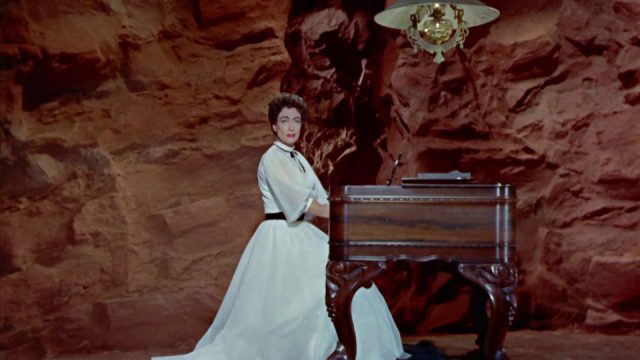Johnny Guitar is not your typical Western. Sure, it’s got gunslingers and horses, red rocks and green trees, a tangible saloon and an intangible specter of a railroad coming to ruin everything, you know what Westerns are like. But a typical Western would focus on the titular character, a man with a past and a…guitar. His name is Johnny and he plays the guitar. That’s why he’s Johnny Guitar. But Johnny Guitar does not care all that much about Johnny Guitar—a character who disappears for like half the movie—and neither should you. This Western focuses on—gasp!—a woman: Vienna, the owner of a saloon called Vienna’s. Her name is Vienna and she owns the saloon. That’s why it’s Vienna’s. This movie is very literal. She has a crew of men in her employ, including a former lover called the Dancin’ Kid (three guesses what he’s known for), and there’s kind of a love triangle with Johnny Guitar, but I already told you not to care about Johnny Guitar. Because the real story here is Vienna’s rivalry with a woman who has her own crew of men: Emma Smalls.
I friggin’ hate Emma. I absolutely loathe her. I can’t recall the last time I felt such antipathy toward a movie villain. At one point the word vile came to mind, and I thought that maybe I was being too harsh on her, but it was because she’d just gleefully set a building on fire, all but cackling like the Wicked Witch of the West at her misdeed, so no, I remain steadfast in my belief that she is a vile creature.
Mercedes McCambridge seethes through the entire movie, baring her teeth like a feral tiger, and the utter in-your-face-ness of her performance certainly made me hate her character more. It’s one note dialed to eleven, and it’s clear she got her start in radio because, wow, this is a larger-than-life radio performance. Joan Crawford plays a similarly proud, fierce woman who is unwavering in her beliefs and good with guns, but her performance is restrained by comparison. It’s as if she’s holding everything in, whereas McCambridge can barely hold herself together. I began to wonder whether Emma might represent Vienna’s dark mirror, the woman Vienna is afraid of becoming.
Or is she, as some have posited, a spurned former lover? Apparently Emma gives Vienna many longing glances, but I miss all the gay subtext in classic films (see also: Gilda). This would certainly explain the fact that she pins the death of her brother specifically on the Dancin’ Kid. Viewing her as an ex may allow us to feel empathy for her, but the film does not seem to want that at all. We don’t see her brother get killed, nor do we see her actually grieve, so we can’t feel that loss along with her and understand why she’s so angry. Why she’s so consumed with rage that she wants vengeance no matter who pays the price.
Which is what makes Emma so utterly detestable. She has her agenda, and she will say anything to achieve it. In 1954, McCarthyism was in full swing, and she represents that mob mentality—she even has her own mob, which gets bigger every time we see her! It’s incredibly frustrating to watch her lie her ass off and make unfounded accusations. She literally tells Turkey, one of Vienna’s associates, to pin the blame on Vienna and they’ll let him live. His choices are to lie or die. What kind of choice is that?
I do want to highlight Emma’s most vulnerable moment—a moment that the original trailer bafflingly ends on—which occurs when she has finally gotten her mob of men to hang Vienna. Except none of them will actually do the deed. They will not hang a woman. Emma cries, “I’ll give one hundred dollars!” Those words echo in her own ears, and it’s the one time she feels like a person and not the human embodiment of pettiness and spite. In that line McCambridge infuses such primal desperation that she’s come this close, so close to achieving her goal, but she can’t believe that her men won’t go all the way. It’s worth noting that Vienna, who wears many fabulously colorful outfits in other scenes, wears a simple white dress, contrasting with Emma’s black dress. Vienna addresses her dark mirror—with what seems like actual empathy, as she has been staunch about her desire not to kill—“You’ll have to do it yourself, Emma.” To Emma’s credit, she does. Respect.
Johnny Guitar is not your typical Western. This beautiful exchange would normally occur between two men trying to out-macho each other; I can even hear the way a John Wayne character would say Vienna’s line, as more of a dare. Though its loose plotting didn’t fully engage me, I don’t think I’ve ever seen a Western that ended in a showdown between two women, and for that I thank you, Johnny Guitar.


